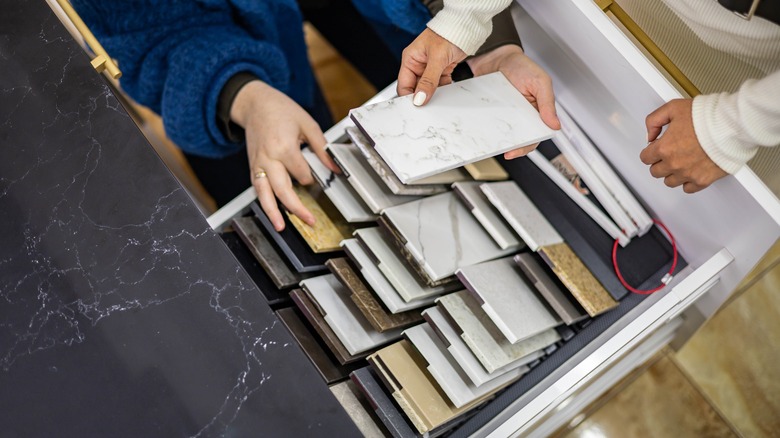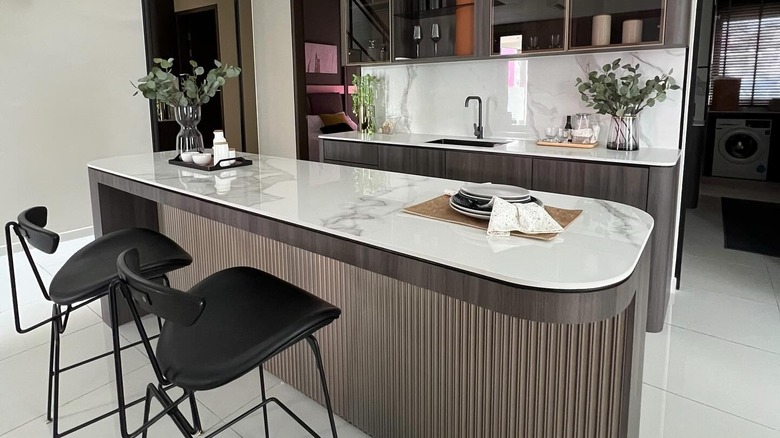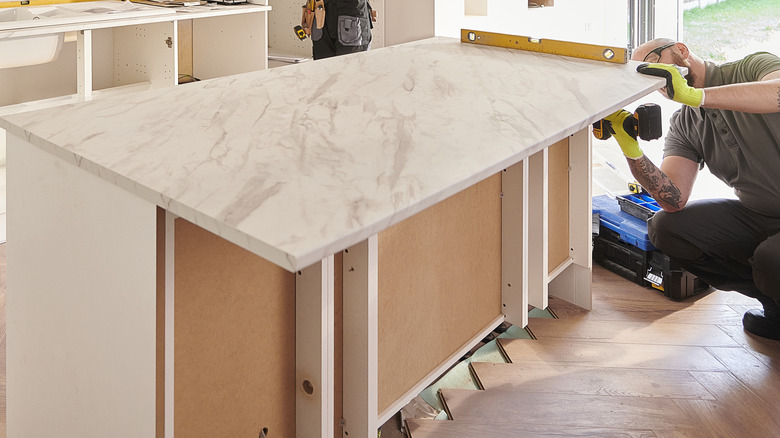The Durable Countertop Material That's Taking Over Home Design
Imagine a scratch-, etch-, and heat-resistant countertop that requires no sealing, is pleasing to the eye, and is eco-friendly. Introducing: sintered stone countertop. The beauty in question is made precisely as its moniker suggests: via sintering. Although the mechanics vary per manufacturer (due to patenting), the modus operandi usually revolves around gathering a host of minerals and recycled materials, such as granite, feldspar, quartz, glass, porcelain, zircon, and albite. They are then powdered and subjected to immense heat and pressure while ensuring the temperatures don't surpass their melting point. Later, this sintered mass is transmuted into sheets that spruce up the countertops installed in your kitchens and bathrooms.
But what makes sintered stone countertops a breath of fresh air is they're mostly—and in some cases completely—silica-free. In case you've missed the memo, the crushing, cutting, drilling, and buffing of silica-rich countertops, like engineered stone (quartz) countertops, during manufacturing and installation is known to release hazardous amounts of silica dust (via the Centers for Disease Control and Prevention.) Breathing in silica can cause lung cancer, autoimmune diseases, and silicosis (an incurable, sometimes fatal, lung disease). While it doesn't afflict homeowners (unless you DIY the fitting), it does affect workers.
Sintered stone countertops have a high tolerance
As kitchen worktops see a lot of action, from sharp knives to hot pans, durability is paramount, and sintered stone countertops don't disappoint. Since they're manufactured under intense pressure—Dekton uses almost 25,000 tons—they become incredibly dense and compact. This greatly reduces their porosity levels, making them highly tolerant of acidic or salty spills and stains. So, you can rest assured your countertop won't look worn with time or require resealing. They're fairly easy to clean, too. Wipe down with a soap-containing DIY cleaning solution, and you're back in business.
Moreover, being pressure-treated, sintered stone countertops are pretty robust and sturdy. Indeed, sharing a score of 7 on the Mohs scale, they equal quartz in mineral hardness levels. This means if you accidentally drop any heavy utensils, your worktop can endure its impact (and scratches) without becoming unsightly. But even if the damage is done, you'll still be looking at the design, as these countertops are solid, not printed only on the surface.
Sintered stone countertops are suitable inside and out
Since most sintering is done at extreme temperatures, just short of the melting point, countertops made of such stones are heat- and fire-proof. For instance, Lapitec, a leading sintered stone manufacturer, professes vacuum compressing its materials and sintering them at temperatures between 1100 and 1200 degrees Celsius (2012 to 2192 degrees Fahrenheit). This is done without using any petroleum derivatives like resins or cement, unlike quartz. It's important, as the lack of resins raised the sintered stone's heat resistance to 300 degrees Fahrenheit, in contrast to about 150 degrees Fahrenheit for quartz countertops.
Moreover, sintered stone countertops are unaffected by UV rays and frost. So, they work like a charm outdoors. Besides, their antibacterial surfaces don't harbor mold or dirt, putting your concerns over hygiene to rest. Also, they come in a variety of colors, including classic whites, grays, browns, and blacks, and offer a host of veined patterns, matte looks, and glossy finishes. Thus, matching them to your décor is effortless. However, avoid installing them on your own, as they require specific cutting tools and are prone to breaking in the hands of an inexperienced DIYer.


